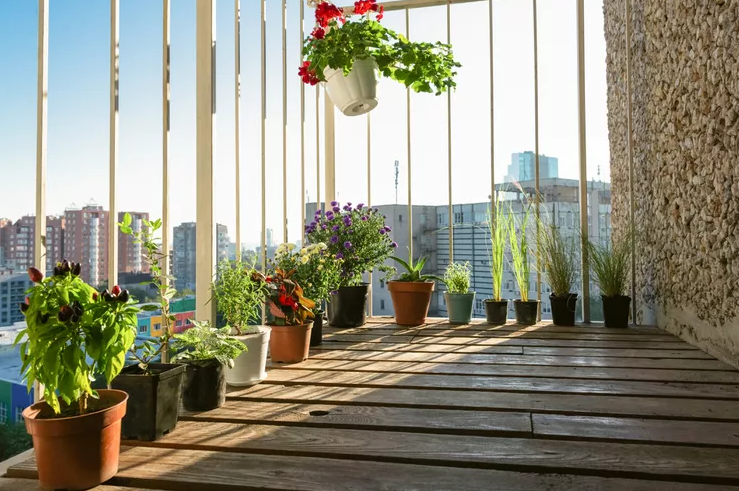
2022-10-20T11:47:47
Questions to Ask Before Starting a Garden Balcony A balcony garden can be as complicated or simple as you want. You can spend thousands or you can make one for very little money. With plant and container choices, you can either make a relatively low maintenance, easy balcony garden or you can do a full-on farm. It depends on your space, light, and exposure and the amount of time, energy, and/or money you want to spend. Balconies are usually microclimates, differing significantly from the climate on the ground. There can even be different microclimates on a tiny balcony. If an area is shaded, that can be one climate, if another area is exposed to the wind, that is a different climate. The conditions on balconies can be extreme, with huge temperature fluctuations. Also, surface treatments can affect how hot or cool your balcony is and if it retains the heat over time. The good news is that there are beautiful plants for almost every condition possible. The trick is to really figure out what the environment is before you plan your garden. If you take the time to really evaluate your conditions, your chances of gardening success will be greatly enhanced. How Big Is Your Space? Even if your space is microscopic, you can still garden. Fire escapes and windowsills can easily become productive green spaces. It helps to think of your space three-dimensionally. Are there vertical spaces you can plant or hang planters on? Even if there aren't, you can do amazing things to create some vertical space. From piling up pots to creating trellises, there are ways to use all of your space. How Much Sun Does Your Space Get? People tend to wildly overestimate how many hours of direct sun a space gets. This is particularly true on a balcony because buildings or walls can obstruct the sun in certain parts of the space. You need to accurately assess how many hours of direct sun each place you want to grow stuff gets. To do this, you will have to either methodically time it out with a watch or get a gardening tool called a sun calculator. You also need to time it close to your growing season, because as the sun moves across the sky, your results will vary from the winter to the summer. How Much Heat Does Your Space Get? Again, balconies and rooftops can get searingly hot. Not all plants thrive in extreme heat, so it's best to take this into account when you are planning what to grow. For example, lettuce will not thrive in extreme heat. On the other hand, succulents will be ecstatic. Is It Windy? Some plants laugh at the wind and others will curl up and die. It's all about choosing the plants that fit your environment, or to a certain degree, modifying your space to expand your plant pallet. There are ways to create windbreaks to protect more fragile plants by planting larger plants that are wind tolerant in front of the more tender. You can also put plants that don't like the wind in low pots near the floor to give them more protection. Wind dries plants out incredibly quickly, so if your area is windy, you will have to compensate for that by either putting in a drip irrigation system, getting self-watering pots or frequently watering your plants--sometimes several times a day. How Much Care Are You Willing to Give Your Gardens? It is a myth that there are "carefree, " or "foolproof, " plants. Unless they are plastic or already dead, all plants need some care. All plants need water, and most need to be fed. Within that truth, there is a broad spectrum of care requirements and degrees of difficulty and there are ways to minimize the amount of watering and feeding you have to do. Think about how much attention you want to pay your plants. Are you available and do you want to water what can be several times a day? Do you travel a lot? If you want to or have to minimize your care, there are options. You can install a drip irrigation system, use self-watering pots with large reservoirs, get drought-resistant, low-care plants or even pay someone to water for you. The best idea, if you are just beginning, is to start slowly. See if you like gardening and see how much time you want to spend and how attentive to your plants you are. You can always buy more plants, but if you start slowly, you can get a feel for what works in your space and what doesn't, before you have made too big a commitment. What's Your Budget? While it's possible to spend an absolute fortune on a balcony garden, you don't need to. You do need to buy a good quality potting soil, but there are all kinds of ways to minimize what you spend. Try finding pots at yard sales or second-hand stores. Almost anything can be turned into a container, so you might not even have to buy one.

Have a question? Ask here!
Required fields are marked *